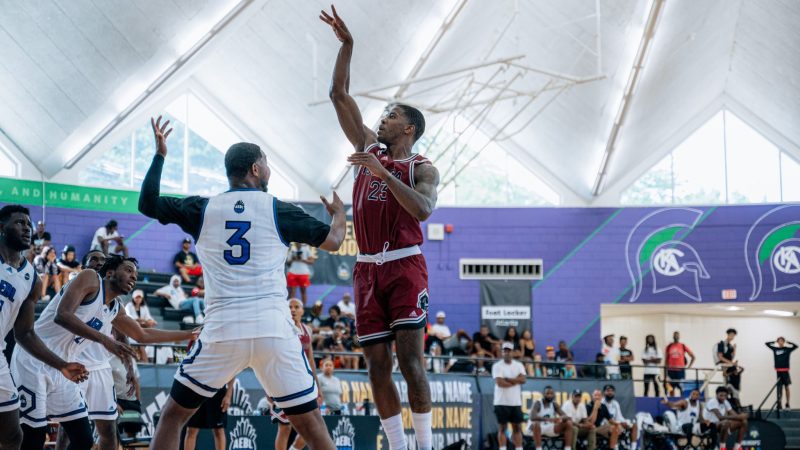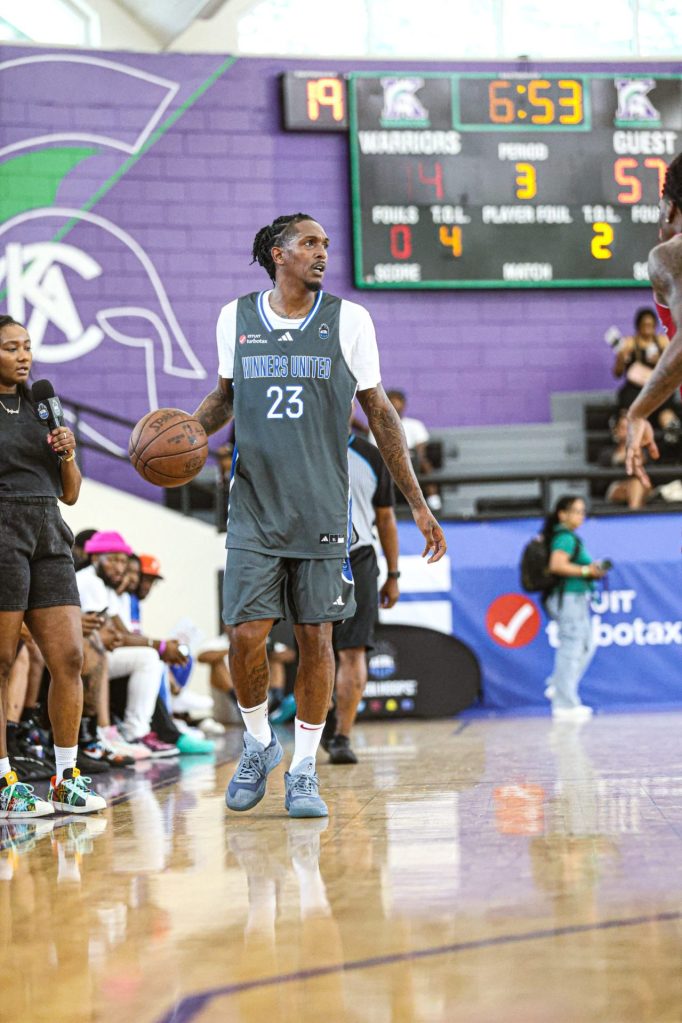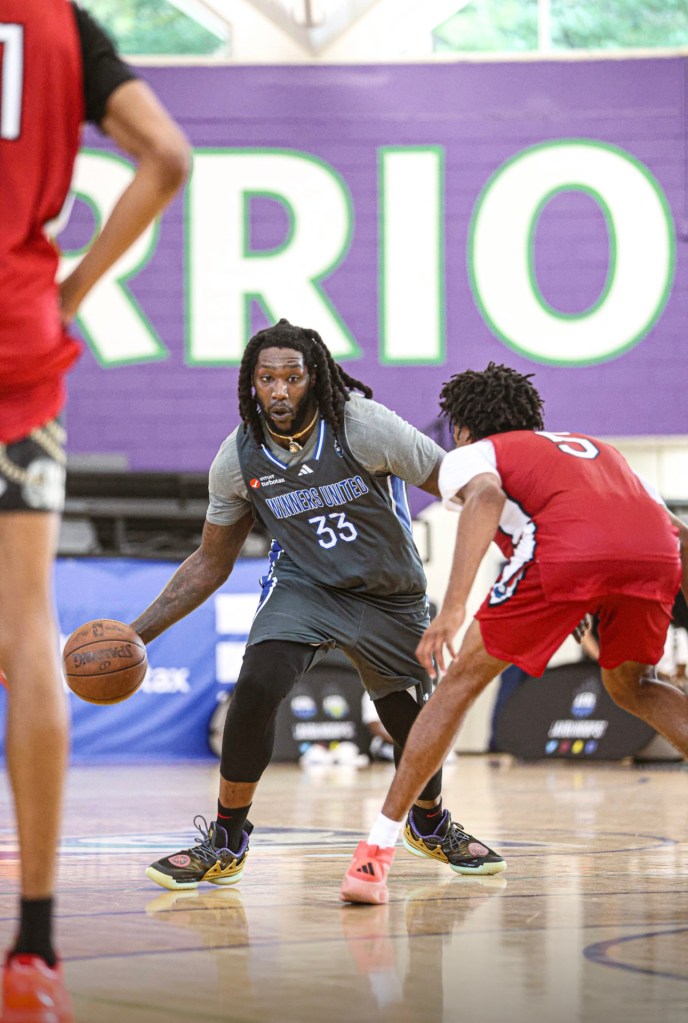Up Next
Atlanta Entertainment Basketball League continues to thrive after 12 seasons
Founder Jahi Rawlings says AEBL is ‘bigger than basketball’

When Jahi Rawlings took on creating the Atlanta Entertainment Basketball League in 2012, he was initially inspired to “bring the Rucker to Atlanta” and combine the city’s rich music and entertainment landscape with its not-always-mentioned basketball culture. In its first seasons, fans saw the worlds collide when rapper Trinidad James took the court with Atlanta hoop legend DeAndre “Lil D The Mosquito” Bray to play against teams spearheaded by NBA shooting guard Lou Williams and 2 Chainz, as emerging artists such as Migos and Young Dolph showed up at games to promote their music. But now, what started as a men’s outdoor summer league with mixtapes getting passed around has blossomed into a basketball institution that includes NBA and WNBA-sanctioned pro-am leagues, youth camps and an HBCU prospect showcase for high school players planning to attend historically Black colleges and universities.
“We really are for the community because we don’t charge to get in our games,” said Rawlings, the founder and commissioner of the AEBL, which kicked off its 12th season on July 6. Through support from sponsors, AEBL games are free to the public and feature small business vendors, food trucks, on-court games, and contests for kids during halftime and timeouts. Besides hosting back-to-school drives, scholarship giveaways, and community givebacks, the league allows fans to meet the players, take pictures and get autographs. “They can’t do that in these other arenas. So when you come to our games, you’re getting all of the aspects of a professional game for free.”

Jay Slaughter/AEBL

Jay Slaughter/AEBL
Fans have seen respected local hoopers from surrounding areas and colleges test their skills against a spectrum of NBA players, including recent NBA Finals opponents Dallas Mavericks guard Kyrie Irving and Boston Celtics guard Jaylen Brown. AEBL has also served as a family reunion as former LA Clippers teammates Montrezl Harrell and Williams have teamed up multiple times. Current and former Atlanta Hawks players Trae Young, Paul Millsap and Joe Johnson have played over the years. Johnson has a team that is going for a three-peat championship this summer.
“Playing in leagues like [AEBL] is therapeutic because it takes you back to your childhood, playing the game with passion in the park or rec leagues, and everybody comes out,” said Johnson, head of the Iso Yoga team, which is named after his new yoga studio in Atlanta. Most Atlantans remember Johnson for his six All-Star Game appearances with the Hawks and when he played for the famed Atlanta Celtics AAU team during his junior year of high school in the late 1990s. “[AEBL] is a very nice intimate setting. It may not be like playing in front of 20,000 people, but the 800 or 1,000 people that do show up? Man, it’s so much fun, bro.”
While many have come to know the league for the men’s play with viral moments such as former Boston Celtics guard Isaiah Thomas scoring a league-record 65 points or Harrell shattering the backboard twice, AEBL has also promoted the women’s game. In 2015, the league began hosting a women’s all-star game during the men’s championship weekend and invited some of the city’s top female players. The all-star game became so popular that an Atlanta Entertainment Basketball League Women’s pro-am was planned for 2020. COVID-19 pandemic restrictions delayed the league until 2021. Now entering its fourth year, AEBLW has become an outlet for women to showcase their playing and coaching skills while at home from overseas play, staying sharp during the college offseason or waiting for their next WNBA opportunity.
“Very few women that played in high school go on to play in college and an even smaller percentage of them go on to play professionally,” said Portia Benbow, the Senior Manager of Community Impact for the Atlanta Hawks. Before her current role, she spent three years working with the AEBL to launch the AEBLW league. Benbow said that though there are a handful of women’s leagues in America, the number is even smaller when it comes to pro-ams and ones that attract top talent. “Leagues like [AEBLW] give women a high-level platform to get exposure again in competitive play, to showcase their talent and to stay in shape.”
Notable players who have played in AEBLW include LSU Lady Tigers standout guard Flau’jae Johnson and Chicago Sky assistant coach Tamera “Ty” Young. This year, the league will feature players such as 2024 Georgia High School Player of the Year and McDonald’s All-American Dani Carnegie, who will be playing her first year at Georgia Tech.
“We always understood the importance of women playing the game and making sure that they had the resources and then also putting the eyeballs on them in a way that I don’t even think that the WNBA understood until recently,” said Rawlings. He said AEBL aspires to expand the women’s summer league and create a league similar to the NBA G League for female players looking to enter or return to the WNBA.
“We want to force the opportunity for women to make more money playing,” Rawlings said. He said that women who want to hoop, let alone be compensated, during the summer are always at a disadvantage compared to their male counterparts.
For perspective, the WNBA plays games during the summer and has 12 teams. With so few roster spots, many players find paid opportunities overseas or accept that they won’t be making money playing anywhere. The NBA’s G League has 31 teams, with the possibility of going to one of 30 NBA teams, and players earn a minimum of $40,500 per season. Rawlings hopes to get at close to paying half of the G League’s minimum salary to female players and allow them to stay in America to play. He has aspirations of creating this new platform by next year.
“It’s gonna transform and really transcend the summer aspect of basketball where we create a pipeline where WNBA teams could also recruit and be exposed to talent they may not even see on the collegiate level.”
AEBL has also entered youth basketball. In the past decade, NBA legends such as Los Angeles Lakers guard Kobe Bryant in 2015 and Lakers forward LeBron James in 2019 have blasted AAU basketball for not teaching fundamentals and focusing on playing more games to make money and justify expensive registration fees. As recently as May, NBA champion and Hall of Famer Alonzo Mourning called the league “tainted” on the All the Smoke podcast.
A 2022 Aspen Institute study reported that rising registration costs and other expenses like shoes, clothes and gear have left many kids out of the growing “pay-to-play” travel team model in youth sports. Many parents reluctantly pay up, hoping to get their kids access to seemingly better resources than their local school or gym rec league can provide. They also see it as an opportunity to be seen by more talent scouts and assume it will create a path to college scholarships and, ultimately, the NBA. So, people with at least a couple of connections and a little know-how create more teams and tournaments to capitalize on those hopes.
“Youth basketball needs to be disrupted,” said Rawlings, who started the Jr. AEBL league in 2020. The league focuses on developing fundamental skills to help kids decide if they want to continue to the next level and have fun while doing so, rather than forcing them. “The actual product of youth basketball is really suffering tremendously because everybody’s focused on the money. Everybody’s focused on their kid becoming a pro or signing an NIL deal and we’re forgetting about making sure that the kids are growing and developing, falling in love with the game.”
The Jr. AEBL league standouts are invited to play for AEBL’s Elite youth teams, which compete exclusively in Adidas’ middle school youth basketball circuits. AEBL created “The 24” High School All-Star Basketball Game for boys and girls and the HBCU Elite 100 Prospect Camp, launched in 2021.
This year, HBCU Elite 100 invites high school and juco players to camps in Atlanta, Chicago, Dallas, New Orleans, New York, and Charlotte, North Carolina, where they can showcase their skills for HBCU basketball coaches and pro scouts. The top 20 prospects in the camps are divided into two teams and play against each other so coaches can get a deeper look at their games. The concept is similar to the long-running National Basketball Players Association 100 camp and Nike Elite 100 camp that funnel highly-ranked high school players to Division 1 colleges and the NBA. The exception is that the HBCU Elite 100 purposely guides interested players to Black colleges.
“We do know and understand that HBCUs before the last couple of years were not sought out among elite athletes, it was always a backup option,” admits Rawlings, noting that he’s seen players get scholarship offers on the spot at the camp. He said 15 boys and eight girls have signed with HBCU teams through the camp. “We want this to be a driving force to get more kids to go to these schools and to create silos for coaches to find the next wave of talent. Because outside of Greek letter organizations and family lineage, you don’t hear about HBCUs being discussed in the sports world.”
To add icing to the cake, Rawlings helped orchestrate a National HBCU Signing Day event in Atlanta this past June to celebrate recent HBCU signees, even those who did not participate in the camp. The event gave them a taste of what athletes attending larger schools experience, inspiring others to follow them.
“It’s a great experience especially because you feel the family vibes here,” said Ny’mire Little, one of the four athletes featured at the signing event. Little will be playing for Clark Atlanta University this fall.
“We’re bigger than basketball,” said Rawlings, who, before launching AEBL, split time managing up-and-coming rap artists and sponsorships for the A3C Festival and Conference while also working as a coach with Nike’s Georgia Stars AAU team and in the Atlanta Hawks basketball development department. “When I created the league, it was to also foster opportunities and connections for people in our community to be able to get access and then be able to get opportunity in the sports world.”